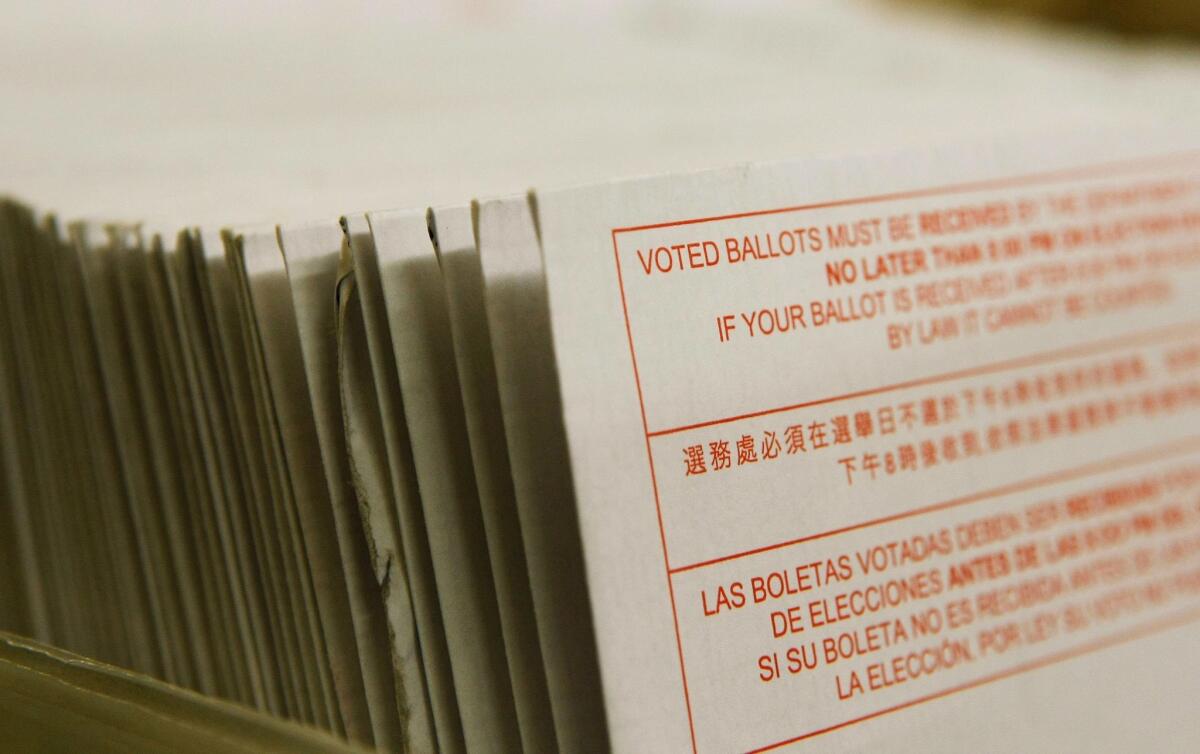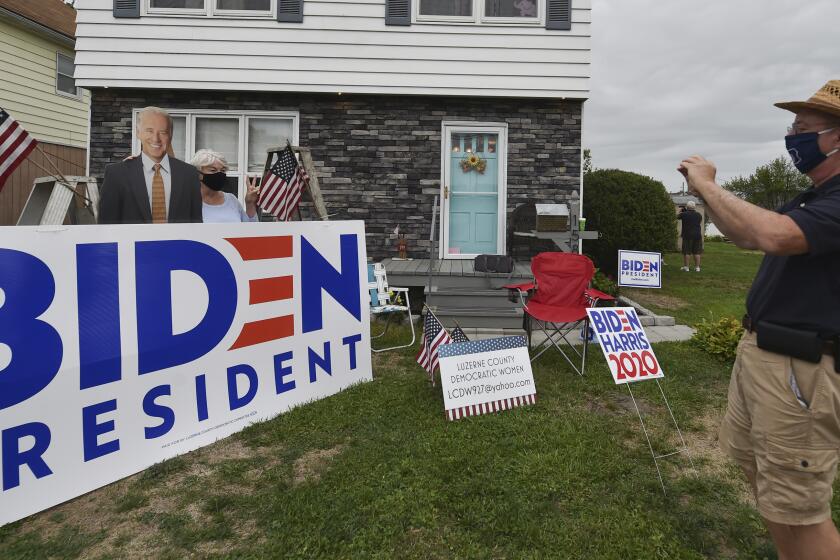Don’t fall for claims of voter fraud. Political operatives want to turn errors into a way to throw the election

- Share via
Let’s admit this now: We are not going to have a perfect election in November. We never have perfect elections.
There will be reports of ballots sent to voters that end up in the trash or in a ditch. We may hear about a box of ballots never delivered to voters or election officials by the post office. There may be isolated instances of fraud, or of things that initially look like fraud but turn out to be election administrator error.
This doesn’t mean we won’t have a fair election overall, and we should not allow cynical political operatives to parlay small-bore errors into a full-scale attack on the integrity of the November vote.
The controversy that bubbled up on Thursday over nine mishandled ballots in Luzerne County, Pa., illustrates the danger ahead. Even before the Department of Justice issued its announcement, President Trump and his team were complaining that mail-in ballots from military voters cast for him were being thrown into the trash, a claim fitting into his narrative — unsupported by the facts — that massive voter fraud will be used to take a November victory away from him. ABC News reported that Atty. Gen. William Barr briefed Trump on the case before it was publicly announced.
The Justice Department bungled the facts with premature announcements. Nine Trump votes were not tossed. That news release was rescinded and replaced: Seven of the ballots had been marked for Trump; two were unopened. Then came yet more information: A memo from Luzerne County that suggested there was no criminal activity related to the ballots, just administrative error. A temporary contract election worker on the job for only three days may have believed the envelopes contained applications for absentee ballots, not votes. The worker was fired when the error was discovered.
The clarifications did not stop a flood of conservative media stories blowing up the situation as some kind of evidence of a massive conspiracy to throw the election. The Luzerne County story is troubling, but not because it showed deliberate tampering. Instead it showed how political operatives — this time acting through the Justice Department — could try to give mistakes the aura of a stolen election for political gain. Whatever one thinks about the department announcing an ongoing political investigation in the midst of the election season (which goes against the DOJ’s own standards and practices), there is no non-political reason for releasing information about how the ballots were marked. This was an in-kind contribution to the Trump campaign by the Justice Department.
President Trump’s talk of a Democratic war on the suburbs is not winning him votes in the actual suburbs. But it may help him in blue-collar areas that proved decisive in 2016.
Luzerne County’s misadventure will not be the last one we hear about in this election. About 137 million Americans voted in 2016, and we could have higher turnout in 2020 despite the pandemic. COVID-19 has caused many more voters to want to vote by mail, and the mail-in process, which mostly works fine, is not perfect.
There is no question some ballots will be mailed to people who have died, or moved or are no longer eligible to vote. But that almost never translates into those ballots being returned by someone else as a voted ballot, an act which would be a felony. And even when isolated instances like this happen, they don’t swing presidential elections. (The idea floated by Barr and the president that foreign governments could create thousands of counterfeit absentee ballots to swing the election is particularly preposterous.)
There is also no question that some election administrators, like those in Luzerne County, will make errors in handling ballots. There are weak links in our election process. And things are bound to be weaker in 2020 compared with 2016 because Congress did not provide adequate funding for the increased costs of running in-person and mail-in balloting during a pandemic. Inadequate resources can lead to more mistakes.
In 2016 we saw sloppiness in the administration of the election in Detroit turn into unsubstantiated claims of deliberate misfeasance by local election officials. An investigation by Michigan’s secretary of state’s office, then run by a Republican, found no instances of intentional wrongdoing.
There are a few steps that election administrators and the media should take given that we are going to have an imperfect election and given that these imperfections may be cynically manipulated by political operatives who want to throw the election results into doubt.
Election administrators need to be transparent. If they make a mistake, they need to own it, explaining what happened, why it happened and how to make it right if that’s possible. They also need to be shoring up their systems now to ensure that weak links will be checked and rechecked, so small mistakes don’t become large ones.
The media need to report claims of misfeasance in elections with caution. This is especially true of local news media that may not know the nuances of balloting, counting votes and certifying results and may therefore be more apt to take the word of political operatives that there is fraud. And given the track record of Barr and the Trump administration, reporters everywhere need to be skeptical of statements made by the Department of Justice.
The days leading up to November’s election may be rocky. But competence, patience, transparency and perspective are the best antidote to attempts to manipulate small-scale election problems into a full blown crisis.
Richard L. Hasen is a professor at UC Irvine School of Law and author of “Election Meltdown: Dirty Tricks, Distrust, and the Threat to American Democracy.”
More to Read
A cure for the common opinion
Get thought-provoking perspectives with our weekly newsletter.
You may occasionally receive promotional content from the Los Angeles Times.










